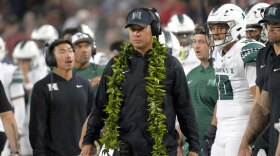Thousands of people gathered at the University of Hawaiʻi's Stan Sheriff Center to witness the historic parade of Pacific Island nations for the opening ceremony of the 13th Festival of Pacific Arts and Culture.
The more than 8-hour event on Thursday commemorated the preservation of Indigenous Pacific culture, with delegates from 25 Pacific nations and territories performing.
Kalani Kaʻanāʻanā, who chairs the FestPAC Commission, said the festival reconnects the Pacific Islands and showcases cultural unity among islanders.
"When we listen to our chants and songs, we hear the voices of generations past reminding us that we are part of an unbroken genealogy," he said during the opening ceremony. "As we engage in dialogue, we build bridges of understanding and dismantle barriers that divide us."

FestPAC was created in 1972 after a group of elders raised concerns over the erosion of culture. It's the first time Hawaiʻi is hosting the 10-day festival, with venues across Oʻahu.
Dancers were adorned in traditional attire, while musicians played Indigenous instruments from each nation. Performers also included the Royal Hawaiian Band and hula dancers from Hawai‘i.
One of the loudest in the crowd was the Tonga islanders, the only Pacific nation that has never lost its Indigenous government.
Viliami ʻAlamameita Takau, the CEO of the Ministry of Tourism in Tonga, said the event is a long overdue family gathering. To capture the solidarity of the Pacific Islands, he paraphrased a saying from the late Tongan scholar Epeli Hauʻofa.
"We are not small islands. We are caretakers of the largest ocean in the world," Takau said.
Tonga is one of several Pacific Islands that gifted cultural artifacts to Hawai'i Gov. Josh Green and First Lady Jamie Green.
Some of those gifts included, but were not limited to, paddles, carvings and a 70-foot tapa.
The delegates have come from three regions of the Pacific Ocean: Micronesia, Melanesia and Polynesia.

One of the most diverse cultures in the Pacific is Papua New Guinea, which has more than 800 languages and hundreds of different cultures.
Other Pacific nations are undergoing language revitalization, such as Rapa Nui, a territory of Chile, where the main language is Spanish.
The Pacific Islands were created by volcanic eruptions. Due to their geological creations, islands naturally sink as new ones are created. But climate change has accelerated the process with rising sea levels, and the Pacific Islands are experiencing its impacts firsthand.
Tuvalu has been a global leader in highlighting the effects of climate change. The island is especially vulnerable to rising oceans, with the highest point measuring just 15 feet above sea level.
As the event passed midnight, Festival Director Aaron Salā gave his closing remarks about the gathering and the challenges of preparing as a host.
"I assure you, ladies and gentlemen, that we have done our very best, given the time and resources we've had over the last few years, to prepare for you," Salā said.
Hawaiʻi was supposed to host the FestPAC in 2020, but the COVID-19 pandemic delayed it another four years.
"But I say to you, this festival will not be perfect," Salā said. "If you seek flaws, you will find them. If you seek the gaps, you will find them. If you seek to be disappointed, you will be disappointed."
"But what you must know is that everything that we are, all of the absolute aloha that we can muster, digging up from the earth, breathing into our DNA, we are pulling for you," he continued.






